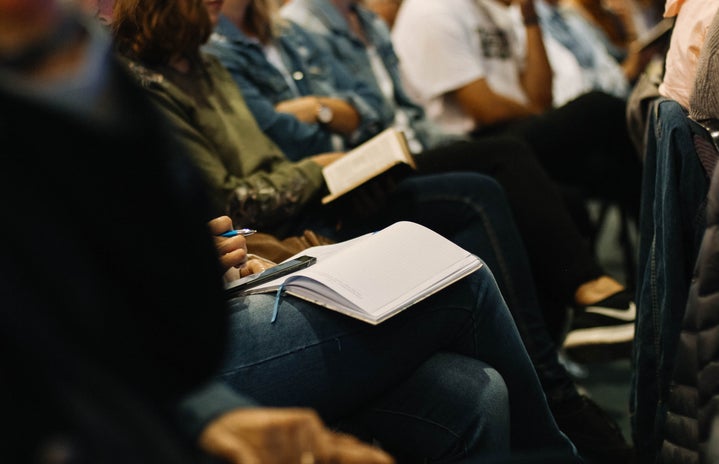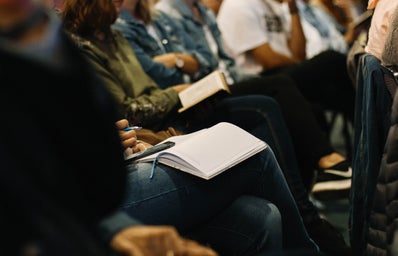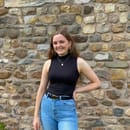On Monday 15 April the Feminist Society held a St Andrews Conference on Interdisciplinary Feminism. This marked FemSoc’s second conference following that of 2023, to which apparently about five people showed up, so it was lovely to see School V full of eager faces.
The conference was made up of five speakers and performers, all of whom work in different roles in St Andrews. The theme of the conference was ‘Liberation’. As Femsoc’s presidents Nina and Kavya explained, the intention behind the theme was to allow for a broad space in which to discuss the intersection of feminism with worldwide struggles for liberation.
The conference began with a talk by Dr Ale Boussalem, who spoke on Queer Muslim Geographies, focusing on Brussels. This talk was fascinating for its discussion on the idea of how queerness is ‘spacialised’. For example, the ‘closet’ is a metaphor for a space which queer people inhabit. However, there is a stereotype which exists of a simple trajectory, where a queer person begins in the closet, and at some point ‘comes out’. However, as Dr Boussalem demonstrated through interviews with participants, we need to disrupt this idea of there being a specific moment of ‘coming out’.
He also discussed how intersectionality often focuses on oppression and that, while this study is vital, we should also consider celebration within intersectionality. Through his research, he explored what he titled ‘Queer of Colour Spaces’, in which LGBTQ+ people of colour may coexist. Even where participants in his research came from very different backgrounds, these spaces might feel more free, offering their inhabitants a place to exist without having to explain themselves. Silence, he explained, can be a liberating feature of Queer of Colour Spaces.
I found this talk very insightful for its consideration of ‘space’ as meaning different things, both physically but also metaphorically. I also liked Dr Boussalem’s disruption of the idea of a singular trajectory in which LGBTQ+ people have a ‘before’ where they exist in the closet, and an ‘after’ when they ‘come out’.
Following this talk, Sana Afraz gave a moving performance regarding the imposed Kashmir border. Her movement acted as a call for Free Kashmir, and invited the audience to confront the complexities of identity, belonging and resilience in the face of adversity. I found her silence during the performance particularly evocative for its representation of the silencing of the Kashmiri people. As Afraz explained after her performance, the restrictions faced by Kasmiris are painful, such as when she has to tick a box confirming her nationality as either Indian or Pakistani.
After Afraz had given her performance, the Rector of the University, Stella Maris, took the stage to speak on tokenism within institutions, and how such institutions can include diverse groups in leadership. Maris’ use of her own experience within her discussion was particularly interesting. She spoke of the Race Equality Charter within St Andrews, which speaks to the efforts of people trying to seek equality, and she highlighted that circumstances have improved since 2017 when she began as a student at St Andrews. However, though Maris was keen to acknowledge successes, she also wished to address that historic issues remain across institutions, such as the prioritisation of white fragility.
In terms of the question of tokenism, Maris highlighted that representing a community does not equate to being representative of the entire community, otherwise it is easy to become a token working within a narrow view of community. As Rector, however, Maris refuses to let the role be merely decorative, and instead seeks to represent oppressed communities by speaking with them and then offering the representation as it is needed. Her talk ended with a powerful statement: ‘You don’t have to accept the idea that your representation is meaningless. You can challenge structures’.
Maris’ talk was followed by a brief break in which conference attendees could buy from a bake sale supporting Women for Women in Gaza. (I can confirm, the cookie and pastry I bought were delicious, plus I was thankful to be supporting such a wonderful cause). Following the break, Dr Uri Horesh took the floor to speak on the Israeli Practice of Pinkwashing and Intersectional Palestinian LGBTQ+ Identities.
They spoke of their own experience as a volunteer at Aguda’s Asylum Seekers and Refugees Department. In this department, they helped LGBTQ+ Palestinians who were seeking asylum in Israel, helping particularly with the translation of forms which are often in Hebrew or English, not offering Arabic. LGBTQ+ Palestinians may, under scrutiny, be offered what is called temporary ‘welfare’ in Israel, based on their sexual orientation and gender identity.
Dr Horesh spoke about Queer Palestinian solidarity. Some people have claimed that LGBTQ+ people supporting Gazans are like “Chickens for KFC”, because in the occupied territories queer and trans identities continue to be the source of public debate as well as being targets of violence. Dr Horesh was quick to argue that, in following the “Chickens for KFC” argument, it erases the existence of LGBTQ+ Palestinians, who have long been fighting for their rights as LGBTQ+ people as well as fighting for their Palestinian identity.
Lastly, Dr Jasmine Gani stepped up to speak on Gaza as a feminist issue. She noted that 98 per cent of the Gazan population have been displaced since October, and also spoke on Scholasticide which has taken place in the past six months. In addition to this, Dr Gani discussed how 75 per cent of those killed have been women and children, suggesting a targeted killing of civilians.
Dr Gani explained intersectionality as a lens through which you can see where power comes and intersects. She detailed the struggles faced by women in Gaza, where women are disproportionately killed and face sexual violence, alongside encountering everyday struggles such as a lack of access to sanitary products.
Yet, this talk also spoke of the resistance of the women of Gaza, who have been preserving life through teaching in schools and working in hospitals; they have been preserving memory by telling the stories of people in Palestine; they have been setting up workshops to make nappies using materials from the pandemic. These efforts cannot overhaul the excessive struggles Gazan women face, but as Dr Gani noted, ‘I am always desperate to cling onto any sign of hope’.
Dr Gani spoke of resistance instead of resilience; from a feminist perspective, resilience can absolve responsibility from perpetrators. Hope is also found in acts of resistance, even in small acts such as Palestinians holding onto keys from houses destroyed. In keeping keys, Palestinians refuse to allow their memories to be wiped. Across the world, resistance is occurring, for example in medical staff holding protests for Palestine.
I found this conference to be brilliant for its diversity of topics and the speakers’ broad response to the theme of ‘Liberation’. There were some powerful and moving discussions and looking around the room I could see how deeply engaged every attendee was. Though there may well have only been five people present last year, this year’s conference had very much grown in size, and I hope that the conference expands in years to come. With such interesting conversation and the commitment of the FemSoc committee, I have no doubt that this will be the case.


